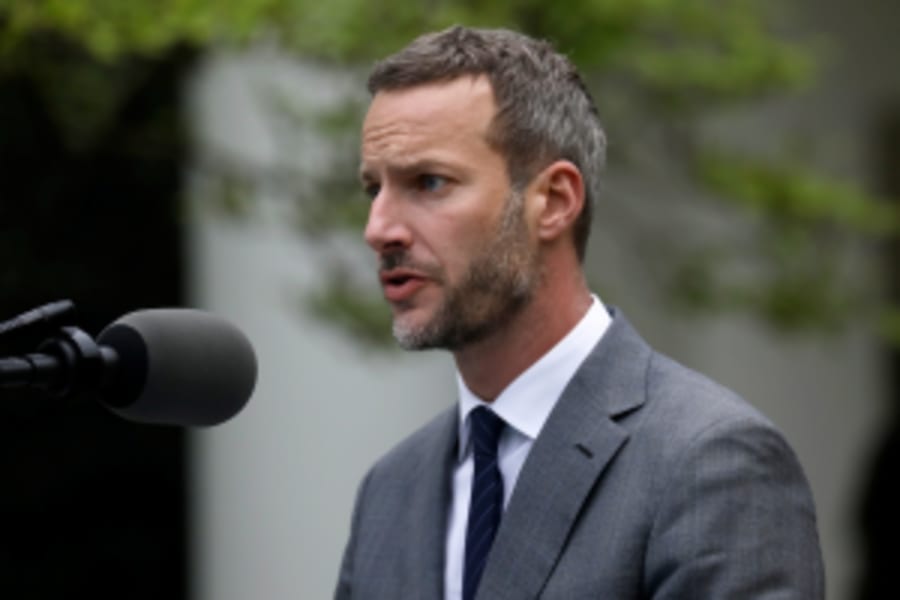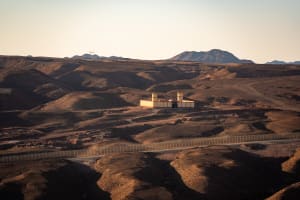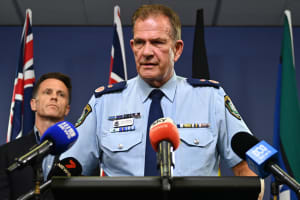Come and harvest olives! Jonathan Feldstein talks about 'Root and Branch' project

On Oct. 7, a year after the brutal Hamas attack, Christian journalist Paul Calvert spoke to Jonathan Feldstein, founder and president of the Genesis 123 Foundation.
“A terribly hard day today, Paul, and we’ve been building up to this,” he began.
Feldstein was born and educated in the U.S. and immigrated to Israel in 2004. He is married and the father of six. Throughout his life and career, he has been dedicated to serving as a bridge between Jews and Christians, and to helping connect Christians to Israel in a meaningful way.
He shared what felt like the most difficult part of the Oct. 7 tragedy, on the first anniversary of the brutal Hamas invasion and terror attack in southern Israel that resulted in the massacre of 1,200 mostly civilian Israelis, the abduction of 251 into the Gaza Strip as hostages and various atrocities, including rape and torture.
“I was speaking with a friend yesterday comparing to September 11," Feldstein said. "The thing on September 11 – is that it ended, and here we are – a year in. And not only is the war with Hamas not over, we still have a very significant front in Lebanon. We continue to have soldiers and civilians killed – still, 101 hostages being held in Gaza, and you and I and everyone else here in Israel is waiting for the shoe to drop with a retaliation response – a proactive offensive measure against the Iranians. And all of that is scary and can trigger something yet much worse,” Feldstein explained.
“It really is inconceivable that there are still hostages in Gaza after year, isn’t it?” asked Calvert.
“Yes, we use the word inconceivable very freely in our language, but I think this is perhaps one of the most accurate definitions… It’s inconceivable on a national level. It’s inconceivable that they were taken hostage to begin with. It’s inconceivable that the world, specifically the United States, hasn’t truly led a forceful initiative that they all must be freed. And it’s inconceivable for those who are alive and the families of everyone who’s still there, dead or alive, because they haven’t been able to have closure.”
Feldstein told Calvert he has spoken to a number of family members of hostages. “I think if it were me, I’d be broken,” he admitted. “And the strength and the resilience and even the hope that they exhibit is inspiring to me, even at this tremendously difficult time.”
Calvert asked Feldstein if he believes the remaining hostages in Gaza have been forgotten.
“No. For sure, the hostages have not been forgotten about,” he answered. “And fortunately, the Israeli public isn’t allowing that.
“The one unfortunate thing, from my perspective,” he continued, “is the conflation between the imperative. And it is an imperative. Also, soldiers know that they’re fighting to free the hostages in Gaza, but the conflation of anti-government protests with freeing the hostages to me is a mistake.”
“The hostages have not been forgotten – and I wouldn’t want to be making any decisions – but there’s still a war that must be conducted and won decisively. And the existence of hostages in Gaza, dead or alive, makes it very difficult for an army and a people that are truly ethical and have a moral obligation to bring everyone home.”
Feldstein spoke about one of the programs his organization, Genesis 123 Foundation, recently initiated and said ‘Root and Branch,’ is “one of the most exciting projects” he has launched to date.
“We are bringing Christians to harvest olives. It only clicked after the war began. As you know, tens, hundreds of thousands of people came to Israel to help, to volunteer, to harvest all kinds of produce. But no one really worked on the olives.”
Feldstein commented on the reason for his excitement: “The olives are probably the ultimate biblical fruit, and from which, when we refer to oil anywhere in the Bible, we’re referring to olive oil!”
As an Orthodox Jew who appreciates Evangelical Christian support for Israel, he told Calvert that he understands the “imperative of Romans [chapter] 11 – that the root supports the branch and not vice versa.”
Starting November 17, 'Root and Branch' will host Christian volunteers from abroad for a 10-day olive harvest in Israel. However, this isn’t just any location– the plan is to travel to the Gaza border area, to the communities that were nearly destroyed in the attacks of Oct. 7, 2023.
“...Today, as we speak, [these communities] are mourning deeply the losses of dozens or hundreds of people,” Feldstein said. “We are going to go in and take the fruit from their trees that otherwise would simply fall to the ground, and make oil from it, possibly other olive related products, and provide from the profit resources back to these communities, that we can help sustain them.”
“Jews and Christians together: It’s going to be a beautiful thing.”
Calvert pointed out that olive oil is very symbolic throughout the Bible.
“I don’t know of any countries whose biggest cities are lined with olive trees along the main roads and in roundabouts,” Feldstein added. “It’s one of the seven biblical [species] here, and unlike all of the others, [it produces] olive oil.”
As well as being essential for cooking and containing a wealth of health benefits, Feldstein added the perspective of the Talmud, the Jewish Oral Law.
“...You actually learn that the pulp is used as fuel. So how amazing that we can squish olives and use the pulp and the pits from inside and create energy.”
“And I think that that’s also very symbolic of.. in Romans 11, Paul says that it’s the root that supports the branch, but how amazing that Christians coming here are the branch, and in this case, coming here to support the root.”
Feldstein credits the idea of the project to his "good friend” Marziyeh Amirizadeh, an Iranian woman who became a Christian and suffered greatly. “Fifteen years ago today,” Feldstein recounted, “she was languishing in a Tehran prison, having been sentenced to death for the crime, they say, of converting to Christianity…”
“Just out of the blue, well before the war began, we were discussing the idea of what really can connect Christians with Israel. And we spoke about the olive and the olive root and the branch. And that’s why it’s called ‘Root and Branch.’”
Calvert asked what happened to the olives in the aftermath of the Hamas invasion of the area.
“The olive harvest was very difficult last year because the harvest season begins right around now, October-November,” explained Feldstein. “And right after the war began, tens of thousands, maybe more, foreign workers fled and just abandoned Israel and their jobs.”
“On top of that, many of the foreign workers were Palestinian Arabs, most of whom, whether from Gaza or from Judea and Samaria, have not come back to their work,” he said.
“And so we’re bringing a restoration…This [illustrates] the example that Paul, in Romans, uses, to inform the Gentile church what the relationship with the Jewish people is, and ought to be.”
Over the last year, significant progress has been made thanks to the involvement of numerous volunteers, both from within Israel and those joining in solidarity from abroad.
“Fifty million dollars worth [has been saved] of oranges and pomelos and grapefruit and cucumbers and peppers and garlic and cotton, and everything in between, that would have fallen to the ground, that would have rotted, and so much did.”
Feldstein added that entire crops have been saved, and by extension, the livelihood of farmers, specifically on the Gaza border.
Calvert asked about the tension between the reality of war, set against the unique opportunity presented by the project.
“We are at war, and no one’s fooling anybody to pretend that we’re not and that there’s not risk here,” Feldstein answered honestly, but explained that the project will take place along the Gaza border, “which arguably is one of the safest places to be in Israel right now.”
The project is practical, but also relational. By visiting Kibbutz Be’eri, Kibbutz Kfar Aza and Moshav Netiv Ha’asara, volunteers will not just be harvesting olives, but have the privilege of “beginning to make, what we pray will be, ongoing, lasting relationships” with the residents who just one year ago, “were under a massive attack,” Feldstein explained.
The initiative will not be a case of “spectators in a zoo,” Feldstein clarified, since the terror-stricken communities are not open for tourism. “But this may very well be the last year that people can come to these communities and bear witness to the physical devastation that was inflicted a year ago.”
He agreed with Calvert about the importance of listening to the personal testimonies of victims, noting that many survivors now view it as their calling to share what happened.
In the recent episode of his ‘Inspiration from Zion’ podcast, Feldstein spoke with a survivor from Kibbutz Be’eri, who told him: "I have no more tears. I’ve cried all the tears." However, Feldstein explained, he continues to tell the stories because the world needs to know and he understands that now, in a post-October 7, 2023 world, that by surviving, that is his responsibility.”
Calvert asked about Feldstein’s prayer for Israel at this time.
“We’ve experienced unparalleled terror and grief in the last year... Most Israelis, really most of us, that’s not rhetoric, are traumatized and need healing in some way. And I’m praying for that healing.
“I’m praying that I’m wrong, that in 50 years, my children and grandchildren won’t be as traumatized by the things that they’ve lived through and experienced. I’m praying that our neighbors, the people who were fighting, will ultimately come to know the true God and actually realize that the Jewish people, the Land of Israel, the State of Israel, are not enemies, but essential allies – biblically, theologically, and for their own prosperity.
“And I pray that we as a people will maintain the same level of unity that’s been so pronounced over the last year. It’s slipping away. We’re seeing political divisiveness, but I pray that however we go forward, even with things that divide us, that we remember to our core, that we are one. The terrorists didn’t discriminate between religious and non-religious, Ashkenazi and Sephardi, kibbutz and city, black and white. We are one people and we must continue to act as one people. And I pray that we will continue to see all of that.”
Feldstein encouraged people to be in touch quickly since the group number is limited to 40. He said subsidies are still available.
To register, visit the Genesis 123 Foundation website at https://genesis123.co/ and click on ‘Root and Branch.’
Click below to listen to Paul Calvert's full interview with Jonathan Feldstein.

The All Israel News Staff is a team of journalists in Israel.













